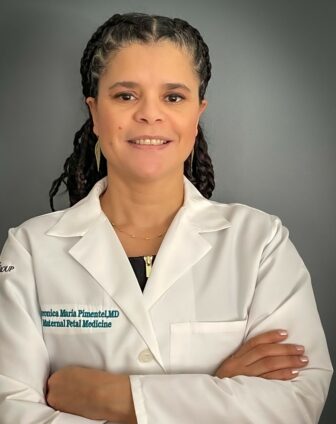By Harriet Jones
Recommend Tweet Email Print More
Dr. Veronica Maria Pimentel, who specializes in obstetrics and gynecology at Saint Francis Hospital in Hartford, recalls a patient who suffered a stroke soon after delivering her baby prematurely. The woman’s Medicaid eligibility ended just two months after she gave birth, despite the complications caused by her stroke and the baby’s premature birth.
Although the woman’s medical coverage ended, Pimentel said, her needs didn’t. “She still needs physical therapy. She still needs occupational therapy. She still needs to be prepared for the rest of her life so she can care for her pre-term baby and herself,” Pimentel said.
Experiences like the new mother’s made Pimentel determined to advocate for changes to Medicaid coverage for women in Connecticut. Those changes will take effect April 1.

Dr. Veronica Maria Pimentel
Pimentel testified before lawmakers last year as the General Assembly considered a bill that would address the coverage gap. The measure was included in the biennial state budget and will take effect April 1, extending postpartum Medicaid coverage to one year. Currently, women whose labor and delivery are covered by Medicaid, but who do not qualify for full Medicaid coverage, are entitled to 60 days of postpartum care.
The extension means that women in a family of three earning between $37,000 and $60,000 will become eligible for a full year of postpartum coverage. The federal government estimates that represents about 4,000 women in Connecticut each year.
Money to fund the Medicaid extension program for five years is included in the federal American Rescue Plan Act.
Prenatal coverage for undocumented women under the state’s Children’s Health Insurance Program (CHIP) will also be expanded. Previously, undocumented women were ineligible because of their immigration status.
“I did my residency in Boston, where there was coverage for all pregnant people,” Pimentel said. “And then coming from Massachusetts, with that sort of universal coverage, and going to Connecticut, you notice that there is a difference.”
“The eligibility rules for the new CHIP program will be in the same systems as the rest of our medical programs, and all of these folks will start through the Access Health CT ‘door,’ like the vast majority of HUSKY Health recipients,” said David Dearborn, a spokesperson for the state Department of Social Services.
More changes are scheduled for next year, Dearborn said. For example, medical coverage for undocumented immigrant children up to the age of 8 will go into effect Jan. 1, 2023, and postpartum care for undocumented immigrant women will follow in April of 2023.
Amy D. Gagliardi, director of the maternal and infant program for Community Health Center Inc., said data supports the need for extended coverage. Gagliardi is co-chair of the women and children’s health committee of the state’s Medical Assistance Program Oversight Council, which recommended the postpartum extension. She said some of the most dangerous pregnancy-related complications—preeclampsia, blood clots and heart problems such as cardiomyopathy—may not surface until weeks or months after delivery.
“The biggest reason women die nationally is cardiovascular disease,” Gagliardi said. “I think the average is over 5½ months after birth,” Gagliardi said.
“There’s a lot of chronic diseases that present during pregnancy. Women may have a predisposition to diabetes, but it will develop in pregnancy. She may have an existing diabetes or an existing hypertension, but it exacerbates during pregnancy.”
— Amy D. Gagliardi
While chronic disease presents a threat, pregnancy-related deaths are relatively rare. In a 2021 report by the Connecticut Maternal Mortality Committee that reviewed state data from 2015 to 2019, there were 25 pregnancy-related deaths. Significantly, according to the report, 48% of pregnancy-related deaths occurred late postpartum, between 43 and 365 days after the end of the pregnancy. (The full report can be found at the bottom of this story.)
The extension of postpartum Medicaid coverage will also help address racial inequities in maternal health. According to the Connecticut report, Black women accounted for 13% of live births from 2015 to 2019 but 20% of pregnancy-related deaths. Women of all races who were covered by Medicaid accounted for 37% of live births but 60% of pregnancy-related deaths from 2015 to 2019.
Infants born on Medicaid are guaranteed coverage through the first year of life. Advocates say aligning the mother’s coverage is also important to ensure compliance with well-child visits.
“That first year is critically important,” said Tiffany Donelson, president and CEO of the Connecticut Health Foundation.
“Having coverage means that a woman has access to get treatment for a variety of things like postpartum depression, and that also impacts an infant’s health and well-being and development.”
— Tiffany Donelson
Pimentel is glad she and her colleagues will no longer have to attempt to squeeze treatments for a new mother into the two-month Medicaid eligibility window. “That gives us a lot more leeway trying to figure out how to help our patients take care of themselves.”
Donelson cautions that the Medicaid changes are only a piece of the puzzle when addressing racial inequities in maternal health outcomes. National figures from the Centers for Disease Control and Prevention (CDC) show that Black women are more than three times as likely to die from a pregnancy-related cause than white women, and the inequity cuts across socio-economic lines.
A 2020 study by the CDC’s National Center for Health Statistics found that maternal mortality in the U.S. increased from 20.1 deaths per 100,000 live births in 2019 to 23.8 in 2020, with mothers of color accounting for the increase. Maternal deaths among Black women rose from 44 deaths per 100,000 live births in 2019 to 55 in 2020. One-third of the pregnant women and new mothers who died in 2020 were Black.
“There is a huge disparity that we need to address within child-maternal health,” Donelson said.
The CDC’s recommendations to reduce Black maternal mortality rates call on hospitals and health systems to address unconscious bias and standardize the coordination of care.
“This is one of the steps in really trying to address the inequities in maternal health outcomes,” Donelson said of the Medicaid changes, “and there’s more that still needs to be done.”
Pimentel said another benefit to the Medicaid coverage extension is establishing a relationship of trust with medical providers.
“Trust is super important. If a patient has found somebody that they trust, they’re more likely to go to their visits,” she said. “When patients know the provider’s name, they feel more satisfied with their care.”
Support Our Work
The Conn. Health I-Team is dedicated to producing original, responsible, in-depth journalism on key issues of health and safety that affect our readers, and helping them make informed health care choices. As a nonprofit, we rely on donations to help fund our work. Donate Now


